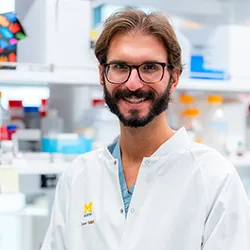Do you want to deliver oral health care and dive deeper into the mechanisms that initiate and promote diseases of the orofacial complex? A combined DDS/PhD or DMD/PhD program may be right for you!
DDS (DMD)/PhD training builds invaluable scientific and leadership skills for academic, industrial, consulting, and government-based positions. I will discuss aspects to consider when determining your oral healthcare career path, the diverse options offered with combined scientific and clinical dental training, and how to best prepare yourself for dentist-scientist training.
What to Consider When Shaping Your Clinical and Scientific Training Experience
As you progress in your pre-professional studies, consider your passions, both now and in the future. How have your lived experiences brought you down the path that you are currently on?
Like most budding dentist-scientists, I found myself initially interested in pursuing a strictly clinical career path. Dentistry uniquely allows one to provide technically rigorous and evidence-based clinical care that, in most cases, is minimally invasive but provides significant physical relief. Providing oral healthcare is fundamental to one’s overall physical and psychological well-being; yet, the etiologies of many oral diseases and malformations of the head and neck area are poorly understood. Understanding mechanisms contributing to poor oral or systemic health allows dentist-scientists to develop less invasive, more innovative therapies and treatments that can repair, replace, or rehabilitate the dentition and the orofacial complex.
I knew I wanted to pursue dentistry since I was in high school. Throughout college, I was exposed to a plethora of research experiences, from breast cancer pathogenesis to materials science and craniofacial biology. It was not until I landed on the last topic that I knew a career intersecting patient care and scientific discovery was for me. Before I applied to DDS/PhD programs, I confirmed this hunch by pursuing a two-year intensive research technician position studying craniofacial morphogenesis. This experience provided an opportunity to ask fundamental questions about development and disease in the context of human health, as many of the genes that regulate facial development, for example, the palate and lip, are shared among humans and model species (mouse and zebrafish). Throughout graduate school, my work has focused on identifying the molecular regulators of skeletal stem and progenitor cells in the appendicular and craniofacial skeletons.
Dentist-Scientist Training Broadens Your Scientific Expertise and Beyond
Future dentists should consider these questions:
- Are you motivated to treat and investigate the pathogenesis of oral health diseases?
- Have you considered non-clinical, alternative career paths that allow you to leverage your clinical training to positively impact patient lives?
- Are you passionate about scientific, technological, and clinical innovation?
- Are you interested in making an impact beyond the hands-on care you can provide to patients?
If you answered yes to any previous questions, consider pursuing these diverse scientific areas.
- Craniofacial, skeletal biology and disease: Congenital malformations of the orofacial complex are some of the most ubiquitous diseases observed in the human population and usually require numerous, complex surgical interventions to the skull and face.
- Cancer biology: Head and neck cancers are devastating diseases with poor clinical outcomes. Currently, reconstructive approaches to replace resected tissues due to cancer invasion are highly invasive, and recurrence rates are high. Novel transcriptomic approaches are bringing insight into the complexity of these cancers aimed at designing personalized therapies.
- Tissue engineering and regenerative medicine: Combining synthetic scaffolds with stem cells to regrow tissues offers an innovative approach to repair and replace congenitally malformed or damaged craniofacial tissues and teeth.
- Materials science: Clinical dentistry relies on inventing new dental materials to provide more affordable, cost-effective, and less invasive treatment options to preserve natural tooth structure while enhancing the longevity of the restorative material.
- Clinical and/or translational research: Once the proof of concept of a novel therapeutic dental modality is confirmed in vitro and/or in vivo, its efficacy must be examined in human subjects. For example, epidemiological studies of the multifactorial etiology of dental caries in pediatric populations are a dire unmet healthcare need.
- Behavioral and/or psychological studies: The study and management of patient’s perceptions of oral healthcare delivery is critically important for ensuring the preservation of natural dentition. This topic delves deeper into the methods by which oral healthcare providers deliver care and the perceptions of their patients.
As you consider this unique professional pathway, you must receive some exposure to scientific research. While this experience does not need to be related to oral health, you should demonstrate your scientific competencies with hands-on basic, translational and/or clinical research exposure. Coupled with a vested commitment to patient care, your pursuit of scientific discovery should be driven by your clinical interests and experience, ultimately allowing you to combine the two paths synergistically.
More on Combined Degree Programs
Dental doctoral programs can be combined with other degrees to build unique career paths.
What Can You Do with Combined Dentist-Scientist Training?
As a scientist and a dentist, what professional avenues are open for you? Here are some common opportunities.
Short-term Training Opportunities
- General Practice Residency/Advanced Education in General Dentistry Residency: If you want to hone your clinical skills before becoming completely independent, then GPR/AEGD programs are excellent opportunities for budding dentist-scientists.
- Advanced specialty education: Did you develop a passion for a specific clinical topic while in dental school? If so, many pursue additional clinical specialty training, including Periodontics, Endodontics, Pediatrics, Orthodontics, Prosthodontics, Oral and Maxillofacial Pathology, Oral and Maxillofacial Surgery, and Dental Anesthesiology.
- Master’s programs in business and public health: Those who anticipate owning a practice or overseeing several dental practices consider specialized business training. Moreover, advanced public health training is an excellent short-term academic pathway for individuals passionate about combatting elements of social determinants associated with adverse oral healthcare outcomes.
- Postdoctoral research training: If your passion lies in basic, translational, or clinical research, pursuing additional scientific training as an independent postdoctoral fellow is an excellent post-graduate training option, especially for those interested in an academic career path. This is also an opportunity that allows one to explore diverse science areas outside of their doctoral studies, thus broadening their scientific knowledge base.
Long-term Professional Opportunities
- Academic researcher: Running a research laboratory as an independent tenure-track professor is a highly rigorous and demanding profession. Yet, it is one of the only career paths that enables one to dictate the scientific questions they ask. If you seek to lead a research group of young scientists, write and apply for research grants, and ask fundamental science questions, this avenue may fit you. As you become more senior in these positions, you can transition into leadership and administrative roles to guide the next generation of dentist-scientists and research-based academic institutions.
- Educator: If you want to teach the next generation of dental clinicians but not run a research lab, an academic appointment as a clinical-track professor will hone your pedagogical and mentoring skills using evidence-based research practices and virtual/augmented reality tools.
- Dental expert and innovator: Paving the way for the future of dental practice and research is a typical career path for dentist-scientists. From a clinical standpoint, the American Dental Association commonly provides recommendations for evidence-based dental practice. The National Institute for Dental and Craniofacial Research oversees and provides funding support and oversees for intramural and extramural research projects.
- Private industry (consulting and research): Given your background in both dentistry and research, there are endless opportunities for your expertise to be valuable in the private sector. Consulting for large dental corporations such as Oral B, Colgate, and Henry Schein offers a unique opportunity to develop dental products, instruments, and technologies for consumers. Additionally, with robust research training, one can pursue scientific positions such as a group leader within pharmaceutical companies may be an option for you. Your knowledge of patient care and scientific discovery will provide a unique and marketable perspective for recruiters.
An Example Educational Pathway
Reflecting upon my last six and a half years of dentist-scientist training and the trajectories of colleagues before me, I am reminded that not all paths to success are created equally. Many of these individuals now run their own independent research laboratories, are successful private practice clinicians, or work in the private sector for large pharmaceutical and biotech companies. The dynamic landscape of career opportunities that becoming dual-trained offers is vast and exciting, constantly innovating by the impact of our predecessors.
With my graduation looming in the spring, I am excited to embark on a new pathway in the form of a postdoctoral fellowship focusing on genome editing of human hematopoietic stem cells. I will also maintain some clinical activity, practicing part-time as a general dentist. Ultimately, these experiences will suit me with the skills needed to become successful in an academic environment, the private sector, and beyond.
Conclusion
Collectively, your pursuit of combined dental and scientific training will equip you with the skills and knowledge to make a lasting impact in your communities. Your reach will be broad, and your colleagues will appreciate your expertise. Here are a few take-home points I would like to leave you with:
- Explore your scientific passions and never stray from a challenge or new opportunity.
- Be confident and bold in your decisions during and after training.
- Develop meaningful relationships and collaborations. The age-old saying, “It takes a village,” is even more true when trying to complete two doctoral degrees in tandem.
- Take advantage of opportunities to bolster your leadership and mentorship skills.
- Be organized, diligent, and focused at every stage of your training. It will be appreciated by your clinical and scientific colleagues and your patients.
Take this time to explore your career options, network with your peers, and gain exposure to diverse educational opportunities. Your path to becoming a dentist-scientist is in front of you; make the most out of every moment!

